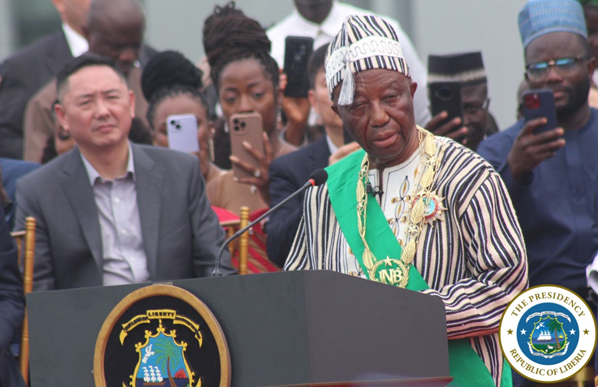President Joseph N. Boakai of Liberia took decisive action against corruption within his administration by suspending 457 officials for failing to declare their assets. This sweeping measure, announced on Tuesday, February 12, 2024, underscores President Boakai’s commitment to transparency and accountability in governance, particularly in light of mounting corruption allegations. The suspended officials represent a wide range of government positions, including ministers, deputy ministers, ambassadors, board members, superintendents, district commissioners, city mayors, and heads of tertiary institutions, demonstrating the president’s resolve to address the issue across all levels of government.
The suspensions are grounded in Liberian law, specifically Article 2, Section 10.2(h) of the Act to Amend Section 5.2 and Section 10.2 of the 2014 Code of Conduct. This legal framework mandates asset declaration for public officials, a crucial measure designed to prevent illicit enrichment and promote public trust. The president’s action follows an earlier directive issued on November 27, 2024, granting officials a ten-day grace period to comply with the asset declaration requirement. The Liberia Anti-Corruption Commission (LACC) played a key role in identifying the non-compliant officials, whose names were subsequently published. The one-month suspension without pay serves as a strong deterrent against future non-compliance and underscores the seriousness with which the administration views this matter.
The suspended officials are required to immediately surrender all government assets under their control to compliant heads of agencies, their designated representatives, or authorized personnel within their respective institutions. This measure ensures the continuity of government operations while upholding the principles of accountability and transparency. The president’s office emphasized that asset declaration is not merely a formality but a legal obligation that serves as a cornerstone of the fight against corruption and the restoration of public trust. President Boakai’s unwavering stance on this issue sends a clear message that non-compliance will not be tolerated.
President Boakai’s decisive action reflects his administration’s commitment to good governance, integrity, and the rule of law. He stressed that failure to declare assets undermines national efforts to combat corruption and ensure accountability, emphasizing that strict enforcement of legal and ethical standards will remain a top priority. This commitment to good governance is not merely rhetorical but is being actively implemented through concrete actions, such as the mass suspensions. The president’s firm stance is crucial in fostering a culture of transparency and accountability within the government and rebuilding public trust in institutions.
The president’s bold move signals a significant step towards tackling corruption within the Liberian government. By holding officials accountable for their financial disclosures, he aims to create a more transparent and trustworthy public sector. This action demonstrates that no one is above the law and that adherence to ethical standards is paramount. The suspensions, though drastic, are necessary to demonstrate the government’s commitment to tackling corruption and promoting good governance. The impact of these suspensions will likely extend beyond the immediate consequences, sending a ripple effect throughout the government and encouraging a greater commitment to transparency and ethical conduct.
In essence, President Boakai’s decisive action sends a powerful message that transparency and accountability are not mere buzzwords but are integral components of his administration’s approach to governance. The suspension of a significant number of officials demonstrates the president’s commitment to tackling corruption head-on and fostering a culture of integrity within the government. This action, though challenging, is vital for strengthening public trust and demonstrating the government’s commitment to upholding the rule of law. The long-term impact of this bold move will be instrumental in shaping a more transparent and accountable public sector in Liberia.














